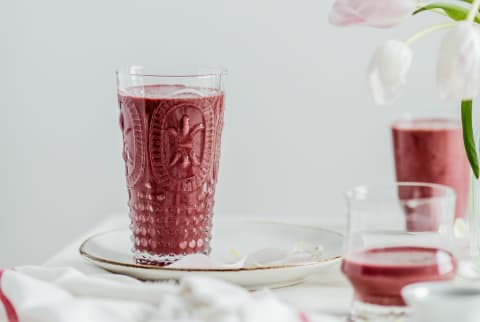Advertisement
The Stress-Busting Tonic This Expert Drinks Nightly For Better Sleep


As a holistic psychiatrist practicing in NYC, I've seen firsthand with my patients that what we eat has a huge impact on our stress levels and sleep quality. The fact is, the typical American diet—which seems to be built on a foundation of sugar, refined carbohydrates, and rosé—isn't doing us any favors. These are all foods that are rapidly broken down, causing our blood sugar to spike. This spike then triggers our body to release insulin, which shuttles sugar into our cells, thereby causing our blood sugar to crash—and the vicious roller coaster continues.
With each blood sugar crash, our body responds with hunger and a stress response. During the day, that stress response looks like "hanger" or even anxiety. Overnight, that same stress response looks like middle-of-the-night wake-ups, often accompanied by racing thoughts, rapid heart rate, and anxiety. Meaning, if you're prone to waking up at night, you're probably in a state of blood sugar dysregulation; and if you also have a tendency to get "hangry" during the day, that further corroborates this hunch.
The good news: We can get smarter and more strategic about how we manage our blood sugar during the day, which can help us tolerate stressors and sleep blissfully through the night. I like to have my patients take a spoonful of coconut oil before bed and, upon waking, set the stage for steady blood sugar by focusing on minimally processed, nutrient-dense whole foods.
Of course, I get a lot of entertaining facial expressions when I recommend slugging coconut oil straight. So, I recently decided, why not make this approach a little more delicious with a blood-sugar-stabilizing smoothie? That way, you can incorporate other foods that have been shown to provide specific sleep-promoting benefits—like melatonin-rich cherries and magnesium-rich almonds and pumpkin seeds—making it that much easier to drift off to dreamland and stay there.
Blended together, the following foods make a delicious stress-busting sleep tonic that I've been sipping after dinner as a prophylactic against restless nights. Let's take a look at the functional significance of each ingredient:
What's in my stress-busting sleep tonic?
Freshly brewed chamomile tea
Here's the rub. Everyone makes smoothies with ice and things like frozen bananas and cold water. I've learned from ayurveda and my clinical and personal experience that warmth and grounding help with sleep and stress tolerance much more than the stimulation of an icy beverage. Try making your smoothie with a base of warm herbal tea instead of cold water or juice. The herbal tea will be blood sugar neutral (in contrast to juice), and the warmth will help lull your body into relaxation or even a sleepy state.
Fresh or frozen cherries (ideally tart cherries)
Tart cherries are delicious, not overly sweet, and are a good source of melatonin, which can help promote sleep (sweet Bing cherries contain melatonin, too, but not quite as much). In fact, drinking tart cherry juice before bed has been shown to1 improve sleep duration and quality in both men and women. I like to recommend the whole fruit, though, to prevent blood sugar spikes. If you have a hard time finding the fresh variety, you should be able to find them frozen—just thaw first.
Coconut oil or ghee
Coconut oil will help keep your blood sugar stable overnight while also adding flavor, texture, and creaminess. Ghee is another way to increase creaminess and blood sugar stabilization. It's also gut healing, which helps decrease systemic inflammation.
Almonds
The fat and protein in the almonds will help slow digestion and blunt the blood sugar spike from the cherries. Almonds are also a good source of magnesium (an ounce contains about 20 percent of your daily value), which can help promote relaxation, stress tolerance, and sleep.
Brazil nuts
Many of us are walking around with deficient levels of selenium. Any nutrient deficiency makes us more prone to stress. It takes about three Brazil nuts a day to get the right amount, and there's no easier way to meet this need than to simply toss them into a smoothie.
Collagen
Collagen has many benefits, from helping rebuild a damaged gut lining to helping your hair, skin, and nails grow strong and healthy. I try to add it to any smoothie I make because it adds a nice dose of protein (important for stable blood sugar) and thickens things up.
Cinnamon
Cinnamon is considered a warming spice in ayurvedic medicine, which can help soothe vata exacerbation and tamp down anxiety levels. I find a little cinnamon helps make a smoothie smell and taste soothing and grounding. Plus, cinnamon has been shown to help balance blood sugar.
Stress-Busting Sleep Tonic
Serves 1
Ingredients
- 1 cup freshly brewed warm chamomile tea
- ½ to ¾ cup tart or sweet cherries (if frozen, thaw)
- ⅛ cup almonds or 1 tablespoon almond butter
- 3 Brazil nuts
- 1 tablespoon coconut oil or ghee
- 1 scoop collagen powder
- ¼ teaspoon cinnamon
Method
Combine all ingredients, and blend until smooth.

Ellen Vora, M.D. is a board-certified psychiatrist, acupuncturist, and yoga teacher, and she is the author of the No. 1 bestselling book The Anatomy of Anxiety. She takes a functional medicine approach to mental health—considering the whole person and addressing imbalance at the root. Vora received her B.A. from Yale University and her M.D. from Columbia University.

Ellen Vora, M.D. is a board-certified psychiatrist, acupuncturist, and yoga teacher, and she is the author of the No. 1 bestselling book The Anatomy of Anxiety. She takes a functional medicine approach to mental health—considering the whole person and addressing imbalance at the root. Vora received her B.A. from Yale University and her M.D. from Columbia University.